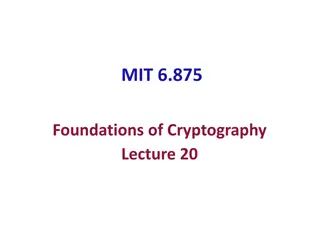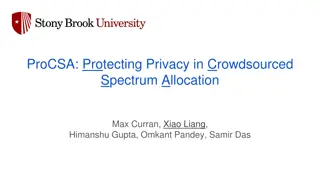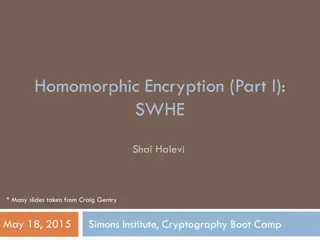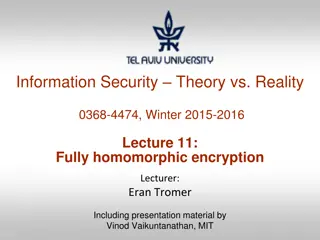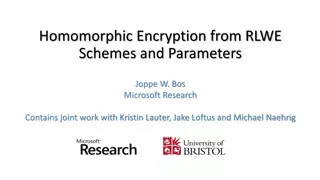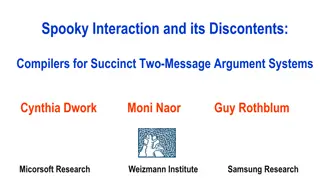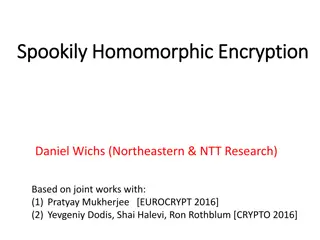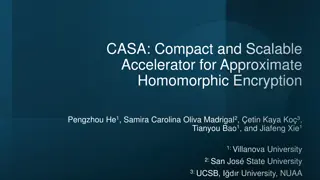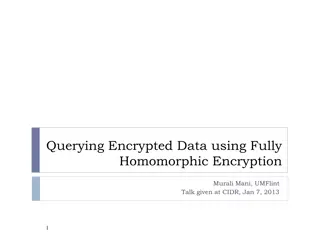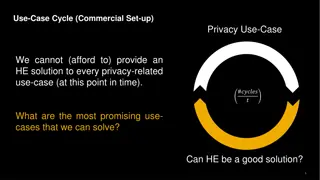Fully Homomorphic Encryption: Foundations and Applications
Fully Homomorphic Encryption (FHE) allows computations on encrypted data without decrypting, enabling secure outsourcing of computations to untrusted servers. FHE involves key generation, encryption, homomorphic evaluation, and decryption processes. It ensures correctness, security, and compactness
0 views • 31 slides
Enhancing Privacy in Crowdsourced Spectrum Allocation
This research focuses on protecting privacy in crowdsourced spectrum allocation, addressing the security challenges faced due to the presence of multiple entities and the sensitive information collected. By proposing potential ideas like Fully Homomorphic Encryption (FHE) and Secure Multi-Party Comp
1 views • 26 slides
Homomorphic Encryption Overview
Homomorphic encryption allows computation on encrypted data without revealing the underlying information. It enables secure delegation of data processing to a server while maintaining privacy. The process involves key generation, encryption, decryption, and evaluation of functions on encrypted data.
0 views • 40 slides
Fully Homomorphic Encryption in Information Security
Delve into the world of fully homomorphic encryption (FHE) with insights from Eran Tromer and Vinod Vaikuntanathan. Explore the implications of FHE on data confidentiality and delegation of computations without revealing sensitive information. Discover its applications in private search and cloud co
1 views • 42 slides
Bootstrapping in Fully Homomorphic Encryption
Fully Homomorphic Encryption (FHE) allows evaluation of unbounded-depth circuits without being limited by specific parameters. Bootstrapping is a critical technique to achieve full homomorphism by refreshing ciphertexts, enabling decryption functionalities within the encryption scheme. This process
0 views • 38 slides
Homomorphic Encryption and RLWE Schemes Overview
Homomorphic encryption allows computation on encrypted data, enabling privacy in outsourced computing services and applications like spam filters for encrypted mail. The Ring Learning With Errors (RLWE) scheme and its properties are discussed, along with symmetric encryption from RLWE and fully homo
0 views • 16 slides
Efficient Multi-Party Computation Techniques
Explore the innovative approaches to Multi-Party Computation (MPC) such as MPC via Fully Homomorphic Encryption (FHE) and Multi-Key FHE. The focus is on minimizing round complexity and achieving secure distributed computations. Learn about key concepts, protocols, and advancements in the realm of MP
0 views • 17 slides
Innovations in Succinct Two-Message Argument Systems
Discover the advancements in compilers for succinct two-message argument systems, exploring concepts like verification of work, interactive proofs, and encryption. Key topics covered include the compiler process, results obtained with secure FHE, and applications in verifying exhaustive search like
0 views • 6 slides
Spookily Homomorphic Encryption Explained
Spookily Homomorphic Encryption, as presented by Daniel Wichs based on joint works with other researchers, explores concepts like Fully Homomorphic Encryption (FHE) and Multi-Key FHE. It delves into the why, what, and how of FHE, with a focus on distributed decryption and achieving non-local relatio
1 views • 37 slides
Zeroizing Attacks on Cryptographic Multilinear Maps: Overview and Applications
Cryptographic multilinear maps (MMAPs) enable computations on encoded secret data, offering similarities to fully homomorphic encryption (FHE) while providing distinct features. MMAPs find applications in identity-based encryption, non-interactive zero-knowledge proofs, and more. The evolution of MM
1 views • 45 slides
Advanced Techniques in Multi-Party Computation
Explore cutting-edge methods in Multi-Party Computation (MPC), including leveraging Fully Homomorphic Encryption (FHE) for minimal round complexity, constructing MPC directly via FHE techniques, and simplifying multi-key FHE constructions for efficient decryption. Learn about key concepts such as di
0 views • 17 slides
Two Round MPC via Multi -Key FHE
Explore the innovative approach of Two-Round MPC via Multi-Key FHE proposed by Daniel Wichs from Northeastern University in collaboration with Pratyay Mukherjee. This joint work introduces a novel protocol for secure multiparty computation, enhancing privacy and efficiency in data sharing scenarios.
0 views • 17 slides
Compact and Scalable Accelerator for Homomorphic Encryption
Fully Homomorphic Encryption (FHE) is a crucial technology for data privacy, with CKKS being a prominent scheme for real-world applications. This paper introduces a novel methodology for CKKS hardware design, addressing existing drawbacks in hardware accelerators. The proposed architecture and pipel
0 views • 26 slides
Private Outsourcing RAM Computation Using Garbled RAM
Learn about the innovative approach to private outsourcing RAM computation using reusable garbled RAM circuits. This method allows clients to efficiently leverage the resources of powerful servers while maintaining data privacy. Explore the concepts of Fully Homomorphic Encryption (FHE) circuits, RA
0 views • 27 slides
Fully Homomorphic Encryption: Overview, Applications, and Security
Explore the world of Fully Homomorphic Encryption (FHE) technology through this comprehensive content covering its applications, security guarantees, and comparisons with other state-of-the-art approaches. Learn how FHE enables querying encrypted data without compromising privacy, and delve into the
0 views • 14 slides
Promising Solutions for Privacy-Related Use Cases
Explore the most promising solutions for privacy-related use cases, including the challenges of implementing Homomorphic Encryption (HE) technology and key pain points in the process. Discover potential areas where HE can be a good solution and the demand for Fully Homomorphic Encryption (FHE) syste
0 views • 4 slides
